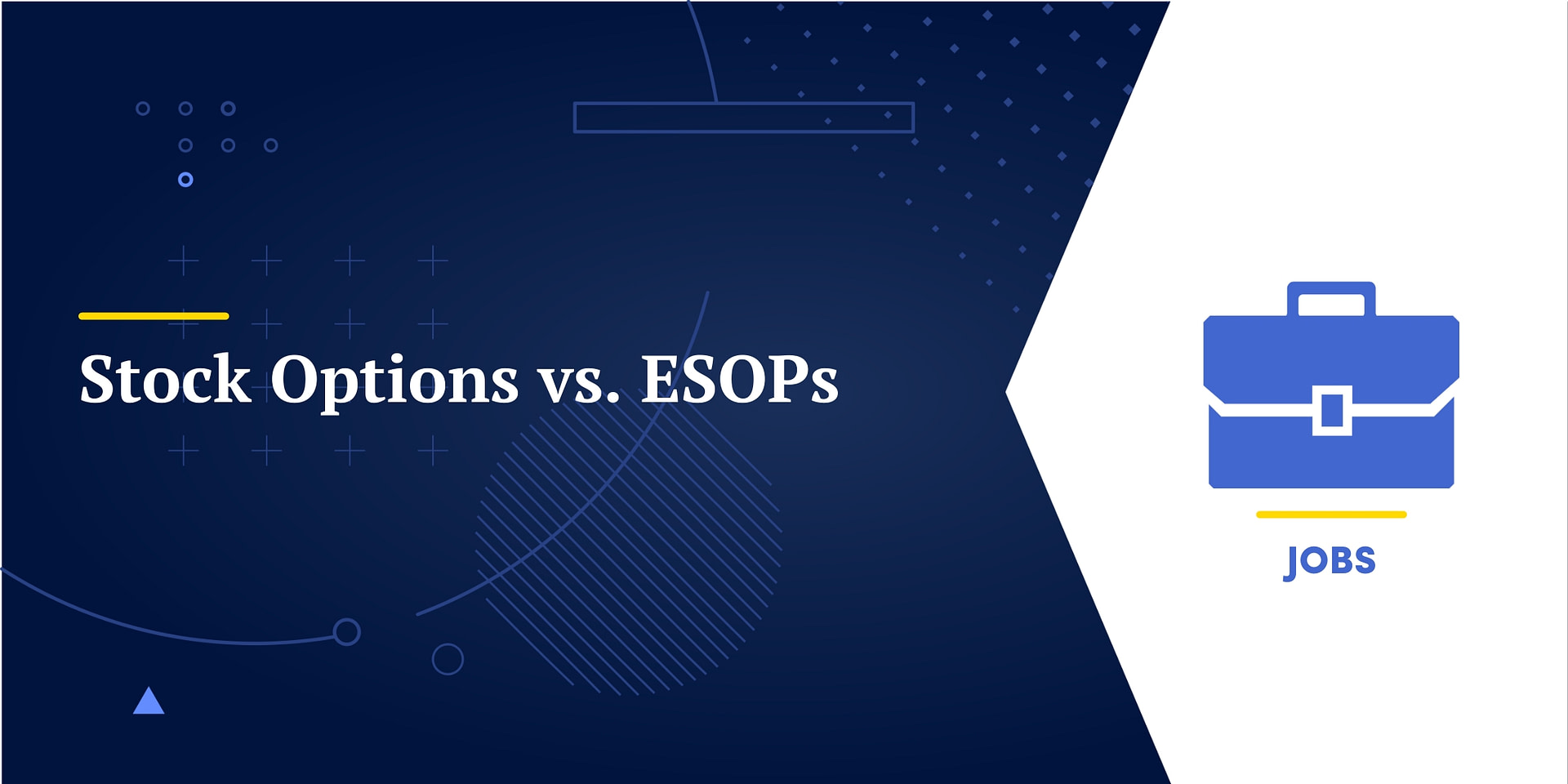Realizing the distinction between inventory choices and ESOPs will aid you consider them and determine what they’re actually value as a part of your compensation bundle.
How Do Inventory Choices Work?
Inventory choices are routinely used to draw potential workers and retain current workers. Inventory choices usually are not shares however are as a substitute the appropriate to purchase the inventory at an agreed value and date.
If you train the choice, you’ll have to pay the choice’s strike value to obtain the inventory. For those who don’t train the choices, they may expire, and you’ll now not be capable to purchase the shares.
You won’t be able to train choices till after the “vesting interval” ends. A vesting interval is a specified period of time you should be with the corporate. A typical vesting schedule offers you choices after one yr after which yearly for 4 years. The longer you keep, the extra choices you obtain.
Workers normally get a reduction on the inventory’s market value. There could be no level in exercising an choice in the event you might purchase the shares for much less on the open market.
How Do ESOPs Work?
An worker inventory possession plan (ESOP) offers workers the appropriate to personal firm inventory.
The plan offers shares of inventory to workers. You don’t have to buy the shares. The shares stay in what is named “belief” in your identify.
Shares are vested over time. You don’t purchase or personal the shares immediately when you are nonetheless employed by the corporate. For those who go away the job, the plan will distribute the shares into your account.
Variations Between Inventory Choices and ESOPs
It will be important so that you can know which kind of plan your potential employer affords. The variations are important.
| Inventory Choices | ESOP |
|---|---|
| You should buy inventory within the firm at a reduced value decrease than the market worth | The corporate offers you inventory–you don’t have to purchase it. |
| You’ll pay tax on any revenue made by promoting the shares.* | You’ll not pay tax till the shares are transferred to your account.* |
| You should buy and promote inventory when you’re “vested”, normally that means after one or two years with the corporate. | You don’t have entry to your shares till you resign or retire. |
* Tax guidelines are complicated. Study extra about taxes on inventory choices and ESOPs.
Similarities Between Inventory Choices and ESOPs
Each kinds of plans come from employers who need to maintain individuals within the firm long-term. Here’s what they’ve in frequent.
- Proudly owning A part of the Firm: With both method, you stand to profit from the corporate’s success.
- Benefitting From the Lengthy Time period: These plans work greatest whenever you allow them to develop over time. Although you possibly can promote the inventory you get whenever you train choices, short-term buying and selling is dangerous. Letting it journey could also be your greatest guess. And, after all, you can’t promote your inventory from an worker inventory possession plan.
In both case, it’s greatest to deal with these plans as a bonus. Loads can occur after you’re taking a job. You might determine to go away earlier than the vesting interval is up. The corporate’s inventory might turn into much less useful than you anticipated.
That doesn’t imply these plans are nugatory. They are often value a fantastic deal. You continue to shouldn’t contemplate them a major consider a choice to take a job due to the inherent uncertainties they pose.
Easy methods to Consider Inventory Choices vs. ESOPs
For those who don’t put money into shares already, proudly owning shares of an organization can sound thrilling. Don’t get too carried away.
Proudly owning inventory could be profitable, however it’s not assured to be profitable. It’s a guess on each the way forward for the corporate and your need to stick with the corporate for an prolonged interval.
Take into account these components when evaluating inventory choices and ESOPs.
1. Is Your Firm Public or Personal?
If your organization’s shares are buying and selling on a inventory change, it’s a public firm. Meaning precisely what the shares are value at any given time, and you understand how their worth has modified over time.
That additionally means that you may promote your shares at any time after you’re taking possession of them.
If your organization is privately held, it could be tougher to assign a price to the shares. There’s additionally no assurance that there’ll ever be a public marketplace for the shares you get. Until there are clear indicators that your organization intends to go public, you possibly can’t assume that the shares will ever be negotiable.
2. Is the Firm Viable?
For those who’re going to work for a startup firm, it’s straightforward to get carried away by visions of what your inventory may very well be value if your organization seems to be the subsequent Google, Fb, or Tesla.
Do not forget that many startups fail. The truth is, 90% fail. Your shares can be nugatory if the enterprise doesn’t make it[1].
If the corporate is already established, perform a little analysis. Has it been dropping gross sales currently? Have earnings decreased? How is it doing towards the competitors?
Personal corporations (ones that don’t promote inventory to the general public) don’t publish such data, however you will discover on-line providers that may aid you calculate the valuation. Public corporations publish the knowledge in quarterly and annual studies to the SEC, so they’re simpler to guage.
3. Is the Firm Inventory Half Of Your Wage?
If a potential employer tries to make use of inventory choices or a inventory possession plan to steer you to take a decrease wage than you in any other case would, watch out. That’s very true if the corporate is privately held or a startup.
Shares usually are not assured earnings. They will lose worth. There might by no means be a marketplace for personal firm shares. Don’t let anybody let you know that shares at all times go up in worth. That could be a basic assertion that won’t apply to your inventory.
Observe that personal firm inventory choices could be powerful to worth. The price of personal firm choices depends upon the worth of the corporate. This requires evaluating it to the same personal firm. However after all, that worth will change over time, so you might be nonetheless left guessing. There isn’t any stable foundation for assigning a price to them when negotiating your wage.
? Rely shares as a risk to earn a living in the long run. You gained’t be shopping for groceries with them.
4. Can You Afford to Train Inventory Choices
Inventory choices sound like a fantastic perk, however you continue to must pay to train them. Many workers find yourself leaving inventory choices on the desk as a result of they’ll’t afford the value.
There are corporations that may aid you finance inventory choice acquisitions, however you’ll have to share the proceeds of any eventual sale with them.
5. What Are the Tax Prices?
Be certain and take a look at taxes when evaluating inventory choices vs. worker possession plans.
Taxes for Inventory Choices
A inventory choice is merely permission to purchase inventory. An choice has no greenback worth. You don’t pay tax on a inventory choice.
For those who select to train your choices, you’ll pay tax in your earnings and dividends. Income from the sale of inventory could also be handled as capital good points or as extraordinary earnings, relying on how lengthy you maintain them.
- You pay capital good points tax on earnings on shares you maintain for at the least one yr earlier than you promote. You don’t owe any tax in the event you don’t promote.
- For those who promote shares after holding them for lower than one yr, your earnings can be taxed as common earnings.
- Dividends can be taxed as common earnings within the yr they’re obtained.
For those who don’t earn a revenue on the inventory sale, you’ll not pay tax.
Taxes on Worker Inventory Possession Plans
You don’t pay tax when your employer awards you inventory as a result of the inventory is held by your employer for you. You solely pay tax whenever you begin receiving distributions out of your inventory account. That is out there whenever you go away the corporate or retire. Normally, you obtain distributions over a five-year interval.
You may select to roll over your shares into an IRA. You gained’t pay tax on the time of the rollover. You’ll pay tax on distributions from the IRA.
? Study extra: Tax guidelines are difficult and that is removed from a whole assessment. You may study extra about taxes on inventory choices and worker inventory possession plans.
Easy methods to Select
Few employers supply all the alternatives we’ve checked out, however chances are you’ll be contemplating two employers, one that gives inventory choices and one that gives a inventory possession plan. Listed here are some standards to contemplate.
Inventory choices provide the alternative to revenue comparatively quickly. You may promote whenever you need (if the corporate is public), that means you don’t have to attend for retirement or resignation. You’ll spend your individual cash to purchase the shares, and you’ll pay taxes in your good points as they happen. Your inventory shares promote at a reduction so you’ve got revenue the second you purchase them. That’s, the market value can be greater than the value you paid.
? The Huge Thought: You may make (or lose) cash every year.
In an worker inventory possession plan, you don’t have to purchase the inventory. It’s a bonus. However you can also’t get it instantly. Solely whenever you go away or retire are you able to get distributions. You don’t pay taxes till that point.
? The Huge Thought: Shares from employer inventory possession plans are for the lengthy, long run. You’ll not get management of the inventory till you permit the corporate or retire.
In observe, worker possession plans are most frequently supplied to executives, whereas rank-and-file employees are usually supplied inventory choices.
Both method, there’s an enormous distinction between being supplied stock-based compensation at a public firm and a non-public firm. Personal firm shares must be thought-about a way more speculative type of reward.
Know Your Acronyms
In investing. you will see many acronyms. It is very important perceive them.
Right here we’ve used “ESOP” to consult with inventory possession plans, the place you obtain free inventory from the corporate.
Sadly, some individuals use “ESOP” to imply “worker inventory choice plan.” which, after all, refers to plain outdated inventory choices.

Can You Lose Cash?
You may’t lose cash in an worker possession plan. As a result of the inventory is a bonus, you didn’t pay something. You would possibly see the inventory go down in worth, however that simply means you bought much less of a bonus than you anticipated. You didn’t put any cash in, so you possibly can’t lose cash.
For those who train inventory choices, you possibly can lose cash. That’s as a result of it’s important to purchase the inventory out-of-pocket. In case your inventory drops in worth, you’d lose cash in the event you bought it.









